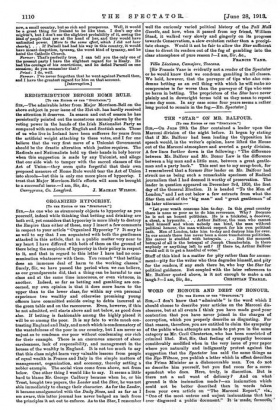ORGANIZED HYPOCRISY.
[To THE EDITOR 07 THE "SPECTATOR."] Sin,—As one who as strenuously objects to hypocrisy as you yourself, indeed while thinking that betting and drinking are both evil, yet considers that hypocrisy is more likely to destroy the Empire than either of these, may I insert a few comments in respect to your article " Organized Hypocrisy "P It may be as well to say that I am acquainted with both the gentlemen attacked in this article, that in a public matter very near to my heart I have differed with both of them on the ground of there being the suspicion of hypocrisy in their policy in respect to it, and that in regard to this letter I have had no com- munication whatsoever with them. You remark "that betting does an immense deal of harm to the working classes." Surely, Sir, we have passed the period when we can believe, as our grandparents did, that a thing can be harmful to one class and at the same time innocuous, or even virtuous, in another. Indeed, so far as betting and gambling are con- cerned, my own opinion is that it does more harm to the upper than to the lower class, for within my own personal experience two wealthy and otherwise promising young officers have committed suicide owing to debts incurred at the green table and on the racecourse. Even, however, if this be not admitted, evil starts above and not below, as good does also. If betting is fashionable among the highly placed it will be so among the poor. It is my fate to write much con- trasting England and Italy, and much which is condemnatory of the wastefulness of the poor in our country, but I am never so unjust as to condemn our poor without condemning our rich for their example. There is an enormous amount of sheer carelessness, lack of responsibility, and management in the houses of the wealthy in England. It is not too much to say that this class might learn very valuable lessons from people of equal wealth in France and Italy in the simple matters of management, organization, and economy, thereby setting a nobler example. The social vices come from above, not from below. One other thing I would like to say. It seems a little hard to blame Mr. George Cadbury because when be, or his Trust, bought two papers, the Leader and the Star, he was not able immediately to change their character. As for the Leader, it became amalgamated with the Daily News, and as far as I am aware, this latter journal has never budged an inch from the principles it set out to enforce. As to the Star, I remember well the curiously varied political history of the Pall Mall Gazette, and how, when it passed from my friend, William Stead, it walked very slowly and gingerly on its progress towards Conservatism, a slow evolution rather than a precipi- tate change. Would it not be fair to allow the Star sufficient time to direct its readers out of the fog of gambling into the clear atmosphere of pure reason ?—I am, Sir, &c.,
FRANCIS VANE.
Villa Licciana, Camajore, Toscana.
[Sir Francis -Vane is evidently not a reader of the Spectator or he would know that we condemn gambling in all classes. We hold, however, that the purveyor of tips who also con- demns betting as an evil thing with which he will make no compromise is far worse than the purveyor of tips who sees no harm in betting. The proprietors of the Star have never plainly and in downright terms told us they mean to repent some day soon. In any case some four years seems a rather long period to remain in the fog.—En. Spectator.]


























































 Previous page
Previous page